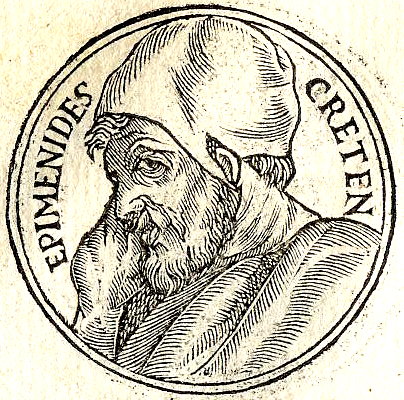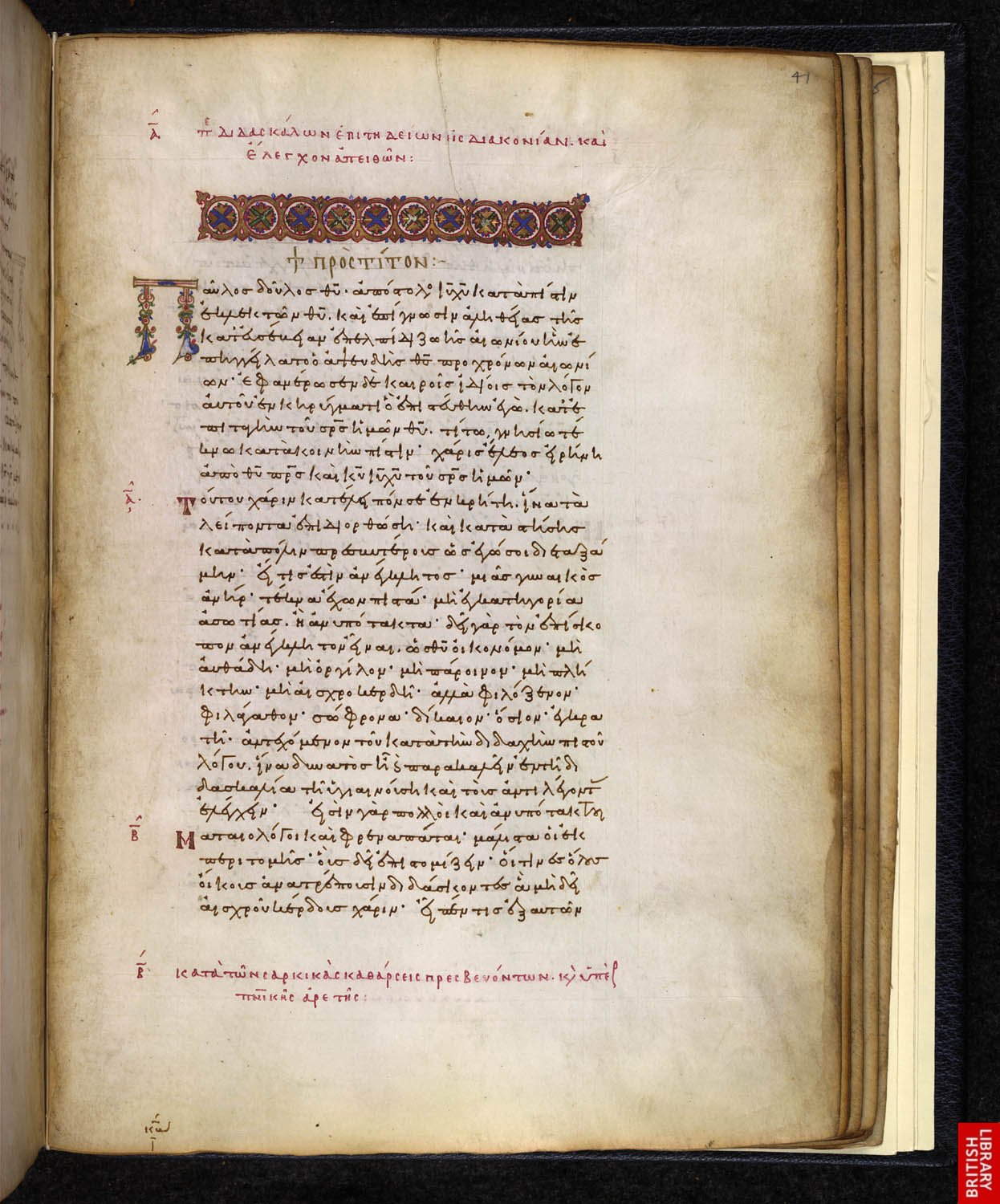|
Epimenides Paradox
The Epimenides paradox reveals a problem with self-reference in logic. It is named after the Cretan philosopher Epimenides of Knossos (alive circa 600 BC) who is credited with the original statement. A typical description of the problem is given in the book ''Gödel, Escher, Bach'', by Douglas Hofstadter: A paradox of self-reference arises when one considers whether it is possible for Epimenides to have spoken the truth. Mythology of lying Cretans According to Ptolemaeus Chennus, Thetis and Medea had once argued in Thessaly over which was the most beautiful; they appointed the Cretan Idomeneus as the judge, who gave the victory to Thetis.In her anger, Medea called all Cretans liars, and cursed them to never say the truth. Logical paradox Thomas Fowler (1869) states the paradox as follows: "Epimenides the Cretan says, 'that all the Cretans are liars,' but Epimenides is himself a Cretan; therefore he is himself a liar. But if he is a liar, what he says is untrue, and conseq ... [...More Info...] [...Related Items...] OR: [Wikipedia] [Google] [Baidu] |
Photius I Of Constantinople
Photios I ( el, Φώτιος, ''Phōtios''; c. 810/820 – 6 February 893), also spelled PhotiusFr. Justin Taylor, essay "Canon Law in the Age of the Fathers" (published in Jordan Hite, T.O.R., & Daniel J. Ward, O.S.B., "Readings, Cases, Materials in Canon Law: A Textbook for Ministerial Students, Revised Edition" ollegeville, MN: The Liturgical Press, 1990, p. 61 (), was the ecumenical patriarch of Constantinople from 858 to 867 and from 877 to 886. He is recognized in the Eastern Orthodox Church as Saint Photios the Great. Photios is widely regarded as the most powerful and influential church leader of Constantinople subsequent to John Chrysostom's archbishopric around the turn of the fifth century. He is also viewed as the most important intellectual of his time – "the leading light of the ninth-century renaissance". He was a central figure in both the conversion of the Slavs to Christianity and the Photian schism, and is considered " e great systematic compiler of the Eas ... [...More Info...] [...Related Items...] OR: [Wikipedia] [Google] [Baidu] |
Insolubilia
In the Middle Ages, variations on the liar paradox were studied under the name of ''insolubilia'' ("insolubles"). Overview Although the liar paradox was well known in antiquity, interest seems to have lapsed until the twelfth century, when it appears to have been reinvented independently of ancient authors. Medieval interest may have been inspired by a passage in the ''Sophistical Refutations'' of Aristotle. Although the ''Sophistical Refutations'' are consistently cited by medieval logicians from the earliest ''insolubilia'' literature, medieval studies of ''insolubilia'' go well beyond Aristotle. Other ancient sources which could suggest the liar paradox, including Saint Augustine, Cicero, and the quotation of Epimenides appearing in the Epistle to Titus, were not cited in discussions of ''insolubilia''. Adam of Balsham mentioned, in passing, some paradoxical statements (dated to 1132), but he did not dwell on the difficulties raised by these statements. Alexander Neckham, writ ... [...More Info...] [...Related Items...] OR: [Wikipedia] [Google] [Baidu] |
Middle Ages
In the history of Europe, the Middle Ages or medieval period lasted approximately from the late 5th to the late 15th centuries, similar to the post-classical period of global history. It began with the fall of the Western Roman Empire and transitioned into the Renaissance and the Age of Discovery. The Middle Ages is the middle period of the three traditional divisions of Western history: classical antiquity, the medieval period, and the modern period. The medieval period is itself subdivided into the Early Early may refer to: History * The beginning or oldest part of a defined historical period, as opposed to middle or late periods, e.g.: ** Early Christianity ** Early modern Europe Places in the United States * Early, Iowa * Early, Texas * Early ..., High Middle Ages, High, and Late Middle Ages. Population decline, counterurbanisation, the collapse of centralized authority, invasions, and mass migrations of tribes, which had begun in late antiquity, continued i ... [...More Info...] [...Related Items...] OR: [Wikipedia] [Google] [Baidu] |
Against The Academicians
Against may refer to: * ''Against'' (album), 1998 album by Brazilian metal band Sepultura ** "Against" (song) the title track song from the Sepultura album *Against (American band) Against (styled as AgainST) were an American crossover thrash band, formed in 2006 for the ''Welcome 2 Venice'' compilation by singer-songwriter Dan Clements, original Suicidal Tendencies members Grant Estes, Louiche Mayorga and Amery Smith and ..., 2006 American thrash band * Against (Australian band), Australian hardcore punk band {{disambig ... [...More Info...] [...Related Items...] OR: [Wikipedia] [Google] [Baidu] |
Augustine Of Hippo
Augustine of Hippo ( , ; la, Aurelius Augustinus Hipponensis; 13 November 354 – 28 August 430), also known as Saint Augustine, was a theologian and philosopher of Berber origin and the bishop of Hippo Regius in Numidia, Roman North Africa. His writings influenced the development of Western philosophy and Western Christianity, and he is viewed as one of the most important Church Fathers of the Latin Church in the Patristic Period. His many important works include '' The City of God'', '' On Christian Doctrine'', and '' Confessions''. According to his contemporary, Jerome, Augustine "established anew the ancient Faith". In his youth he was drawn to the eclectic Manichaean faith, and later to the Hellenistic philosophy of Neoplatonism. After his conversion to Christianity and baptism in 386, Augustine developed his own approach to philosophy and theology, accommodating a variety of methods and perspectives. Believing the grace of Christ was indispensable to human fr ... [...More Info...] [...Related Items...] OR: [Wikipedia] [Google] [Baidu] |
Stromata
The ''Stromata'' ( el, Στρώματα), a mistake for ''Stromateis'' (Στρωματεῖς, "Patchwork," i.e., ''Miscellanies''), attributed to Clement of Alexandria (c. 150 – c. 215), is the third of a trilogy of works regarding the Christian life. The oldest extant manuscripts date to the eleventh century. The work is titled ''Stromateis'' ("patchwork”) because it deals with such a variety of matters. It goes further than its two predecessors and aims at the perfection of the Christian life by initiation into complete knowledge. It attempts, on the basis of Scripture and tradition, to give such an account of the Christian faith as shall answer all the demands of learned men, and conduct the student into the innermost realities of his belief. The contents of the ''Stromateis'', as its title suggests, are miscellaneous. Its place in the trilogy is disputed – Clement initially intended to write the ''Didascalus'', a work which would complement the practical guidance of th ... [...More Info...] [...Related Items...] OR: [Wikipedia] [Google] [Baidu] |
Apostle Paul
Paul; grc, Παῦλος, translit=Paulos; cop, ⲡⲁⲩⲗⲟⲥ; hbo, פאולוס השליח (previously called Saul of Tarsus;; ar, بولس الطرسوسي; grc, Σαῦλος Ταρσεύς, Saũlos Tarseús; tr, Tarsuslu Pavlus; la, Paulus Tarsensis AD), commonly known as Paul the Apostle and Saint Paul, was a Apostles in the New Testament, Christian apostle who spread the Ministry of Jesus, teachings of Jesus in the Christianity in the 1st century, first-century world. Generally regarded as one of the most important figures of the Apostolic Age, he founded Early centers of Christianity, several Christian communities in Asia Minor and Europe from the mid-40s to the mid-50s AD. According to the New Testament book Acts of the Apostles, Paul was a Pharisees, Pharisee. He participated in the Persecution of Christians in the Roman Empire, persecution of early Disciple (Christianity), disciples of Jesus, possibly Hellenistic Judaism, Hellenised diaspora Jews converte ... [...More Info...] [...Related Items...] OR: [Wikipedia] [Google] [Baidu] |
Saint Titus
Titus ( ; grc-gre, Τίτος; ''Títos'') was an early Christian missionary and church leader, a companion and disciple of Paul the Apostle, mentioned in several of the Pauline epistles including the Epistle to Titus. He is believed to be a Gentile converted to Christianity by Paul and, according to tradition, he was consecrated as Bishop of the Island of Crete.Smith, William. ''Smith’s Bible Dictionary'' 11th printing, November 1975. New Jersey: Fleming H. Revel Company. pp. 701–02. Titus brought a fundraising letter from Paul to Corinth, to collect for the poor in Jerusalem. According to Jerome, Titus was the amanuensis of this epistle (2 Corinthians). Later, on Crete, Titus appointed presbyters (elders) in every city and remained there into his old age, dying in Gortyna, near the city of Candia (modern Heraklion). Life Titus was a Greek, apparently from Crete who is said to have studied Greek philosophy and poetry in his early years. He seems to have been converted by ... [...More Info...] [...Related Items...] OR: [Wikipedia] [Google] [Baidu] |
Epistle To Titus
The Epistle to Titus is one of the three pastoral epistles (along with 1 Timothy and 2 Timothy) in the New Testament, historically attributed to Paul the Apostle. It is addressed to Saint Titus and describes the requirements and duties of elders and bishops. Harris, Stephen L., ''Understanding the Bible''. Palo Alto: Mayfield. 1985. Recipient Not mentioned in the Acts of the Apostles, Saint Titus was noted in Galatians (cf. Gal. 2:1, 3) where Paul wrote of journeying to Jerusalem with Barnabas, accompanied by Titus. He was then dispatched to Corinth, Greece, where he successfully reconciled the Christian community there with Paul, its founder. Titus was later left on the island of Crete to help organize the Church, and later met back with the Apostle Paul in Nicopolis. He soon went to Dalmatia (now Croatia). According to Eusebius of Caesarea in the ''Ecclesiastical History'', he served as the first bishop of Crete. He was buried in Cortyna (Gortyna), Crete; his head was lat ... [...More Info...] [...Related Items...] OR: [Wikipedia] [Google] [Baidu] |
Callimachus
Callimachus (; ) was an ancient Greek poet, scholar and librarian who was active in Alexandria during the 3rd century BC. A representative of Ancient Greek literature of the Hellenistic period, he wrote over 800 literary works in a wide variety of genres, most of which did not survive. He espoused an aesthetic philosophy, known as Callimacheanism, which exerted a strong influence on the poets of the Roman Empire and, through them, on all subsequent Western literature. Born into a prominent family in the Greek city of Cyrene in modern-day Libya, he was educated in Alexandria, the capital of the Ptolemaic kings of Egypt. After working as a schoolteacher in the city, he came under the patronage of King Ptolemy II Philadelphus and was employed at the Library of Alexandria where he compiled the '' Pinakes'', a comprehensive catalogue of all Greek literature. He is believed to have lived into the reign of Ptolemy III Euergetes. Although Callimachus wrote prolifically in prose ... [...More Info...] [...Related Items...] OR: [Wikipedia] [Google] [Baidu] |
Poem
Poetry (derived from the Greek '' poiesis'', "making"), also called verse, is a form of literature that uses aesthetic and often rhythmic qualities of language − such as phonaesthetics, sound symbolism, and metre − to evoke meanings in addition to, or in place of, a prosaic ostensible meaning. A poem is a literary composition, written by a poet, using this principle. Poetry has a long and varied history, evolving differentially across the globe. It dates back at least to prehistoric times with hunting poetry in Africa and to panegyric and elegiac court poetry of the empires of the Nile, Niger, and Volta River valleys. Some of the earliest written poetry in Africa occurs among the Pyramid Texts written during the 25th century BCE. The earliest surviving Western Asian epic poetry, the '' Epic of Gilgamesh'', was written in Sumerian. Early poems in the Eurasian continent evolved from folk songs such as the Chinese ''Shijing'', as well as religious hymns (the Sanskr ... [...More Info...] [...Related Items...] OR: [Wikipedia] [Google] [Baidu] |




.jpg)


.jpg)